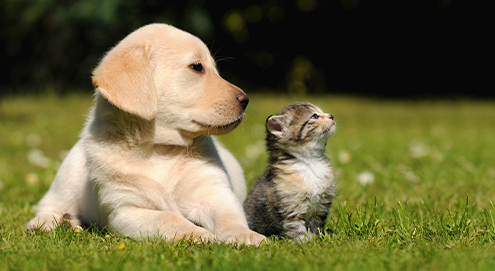The best diet after surgery or illness
Written by Tommy |
The time after surgery, illness or injury is called recovery. (Temporarily) changing your pet’s diet during the recovery period may be beneficial. In this blog, we’ll discuss why and possible diets.

Why change your dog’s diet?
During recovery, your pet exercises less, burns less energy and risks gaining weight. Weight gain is usually unwanted, which is why there are diets with a lower energy-level (kcal) per 100 g of kibble.
Diets after neutering/spaying
These days, neutering/spaying is a “standard surgery”. Even so, changing the diet after spaying/neutering is important. Removing part of the reproductive organs changes the endocrine system, which affects the metabolism. The biggest indicator of an affected metabolism is gaining (or losing) weight more easily. There are special diets for spayed/neutered cats and dogs:
- Royal Canin VCN Neutered Adult – Dog Food
- Hill’s Science Plan Perfect Weight – Dog Food
- Veterinary HPM Adult Neutered – Dog Food
- Royal Canin VCN Neutered – Cat Food
- Hill’s Science Plan Sterilised – Cat Food
- Veterinary HPM Adult Neutered – Cat food
Diet after orthopaedic surgery
Orthopaedic surgeries include TTA, luxating patella and hernia surgery. All these treatments revolve around joints and have a big impact on the body during recovery. It takes an average of 6 months after surgery for your dog or cat to be fully recovered. During the recovery period, you can choose to feed a diet that supports both joints and weight. Some examples are:
- Vetality Metabolic & Mobility – Dog Food
- Hill’s Science Plan – Perfect Weight & Active Mobility – Dog Food
- Royal Canin Mobility Support – Cat Food
- Hill’s j/d Joint Care – Cat Food
Diet after or during illness
An ill animal is likely to lose weight, especially when vomiting or diarrhoea is involved. It may be wise to feed a diet with more energy (kcal) per 100 g during this period. These diets often come as wet food, to help restore fluid balance. Examples are:
- Royal Canin Recovery – For dog and cat
- Hill’s a/d Restorative Care – For dog and cat
- Specific Intensive Support – For dog and cat
- Purina Pro Plan Veterinary Diets CN Convalescence
Diet after dental treatment
There are many types of dental treatment. Sometimes it’s just a teeth cleaning, but other times teeth and molars may need to be removed. This can cause discomfort during eating and changing your pet’s diet for the first few days may be wise. Opinions differ on whether wet food or dry food is better after dental treatment. Just pay attention to what your pet prefers and adjust accordingly.
It’s wise to switch your dog or cat to food that stimulates chewing once his gums are healed. This is an easy way to help prevent dental plague. Diets that are specifically geared towards dental health are Royal Canin Dental for dogs and cats and Hill’s t/d Dental Care for dogs and cats.
Do you have any questions about your pet’s diet during his or her recovery or is your pet scheduled for a treatment we didn’t mention? Don’t hesitate to contact our veterinary team at veterinarian@vetsend.co.uk.



